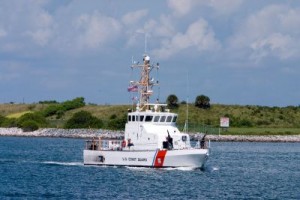 If you are currently the owner of a boat, you know the importance of the Coast Guard to the operation of your vessel. If you are considering the purchase of a boat, you should most definitely become familiar with the authority of the Coast Guard. Understanding boating safety regulations and the rules of navigation are essential to the legal operation of your vessel. The Coast Guard, at any time, can board and inspect your boat. It is imperative to have the proper safety equipment required to pass inspection.
If you are currently the owner of a boat, you know the importance of the Coast Guard to the operation of your vessel. If you are considering the purchase of a boat, you should most definitely become familiar with the authority of the Coast Guard. Understanding boating safety regulations and the rules of navigation are essential to the legal operation of your vessel. The Coast Guard, at any time, can board and inspect your boat. It is imperative to have the proper safety equipment required to pass inspection.
U.S. Coast Guard is the federal regulating agency for recreational boats. As such, the Coast Guard issues boating safety recommendations and ensures the proper compliance with federal boating safety laws and equipment requirements. It is also essential to learn about federal boating safety requirements and the authority of the Coast Guard to board your vessel, issue citations, terminate your voyage, and charge you with negligence, gross negligence or boating while intoxicated.
Boats are like cars in that they must be registered with a licensing authority. Depending upon the size and use of a boat, some vessels are required to be documented with the U.S. Coast Guard National Documentation Center. This is only required if the vessel is more than 5 net tons and engages in fishing or coastwise trade. In recreational boating cases however, the Coast Guard only requires “vessels equipped with propulsion machinery to be registered in the state of principal use.” The best way to ensure the certificate number is readily available in the event of a law enforcement boarding is to put in a zippered plastic bag and store it in a secure, watertight compartment aboard your boat.
The Coast Guard has certain boating safety requirements for recreational boats up to 65 feet. While the safety laws are essentially the same for each size category of boats, some differ. All boats must have state numbering and letters. They must be contrasting in color to the boat, not less than 3 inches in height, and located on each side of the forward part of the boat. It must also have a state decal within six inches of the registration number. It goes without saying that there must be personal floatation devices that are Coast Guard approved and there must be one available for each person on board.
Your boat must have a visual distress signal when operating between sunset and sunrise. One electric or three combination red flares are options. There must be a ONE MARINE TYPE fire extinguisher if your boat has an inboard engine, enclosed compartments where fuel or flammable and combustible materials are stored. You must also keep a sound producing device on board like a whistle or an air horn. Navigational lights must be displayed at dusk and after. Natural ventilation is required for boats built after April 25, 1940 and if it uses gasoline in an enclosed engine. If it was built after July 31, 1980, it must have an exhaust blower.
If the Coast Guard is contemplating doing a search of your boat, they will call you on a VHF channel. You are supposed to be monitoring that signal. If you are not, that will assure that your boat will be boarded and inspected by the Coast Guard. If your boat does get boarded by the Coast Guard, remember to have all documents and registration ready and easily accessible. If you are fumbling around and searching or paperwork, this will be a red flag for the Coast Guard. Do not wait for a Coast Guard visit to determine if all of your safety requirements are in place. Your boat should be inspected for safety guidelines each time you set out on your boat. You may also be asked if there are firearms on board. It is imperative to answer this question honestly. They will most likely ask you where they are and proceed from there. The more honest you are about the questions, the less likely it will be to have any problems with the search of your vessel. If it is determined to proceed with a search, just stand aside and let them search. They are not looking for a guided tour. Sometimes, if you are overly friendly, this will hinder the process. If you are running at night, have the required lighting. A dark ship will most certainly alert the Coast Guard.
Remember, searches and inspections are part of what keeps boaters and their passengers safe. If it happens to you, go with the flow. As always, the rules of safety are in place for a reason.
Source: “Boating Safety Rules for Boats Under 16 Feet.” About.com Powerboating. Web. 17 Dec. 2012. Reininger, Stuart. Motor Boating. Rep. Hearst Corporation, Gale Group. Web. 17 Dec. 2012.
Follow Us: Facebook – Foursquare – Twitter – YouTube – LinkedIn
